|
Godzilla
For many of you, the most important question is simple: is this version of Godzilla better than that horrifically stupid 1998 version directed by Roland Emmerich?
Yes.
Though Director Gareth Edwards could have picked up Bandai action figures of monsters from the venerable Toho franchise, thrown them at each other and made the roaring sounds himself and it would have probably still been better.
Sorry. Had to get that out of my system.
What about the Godzilla we have before us now? Well, it's an interesting monster of a monster movie.
Edwards has tried to balance many different types of expectations. Some people really want a scary movie about a giant monster destroying landscapes and punishing us for crimes against nature. Some have fond memories of guys in rubber monster suits pummeling each other. And in the 21st Century, it's kind of hard not to really start to be devastated by the devastation.
So if this movie doesn't quite meet all those expectations, it's still a heck of a noble effort, and many will find it hitting just enough buttons to make it worthwhile -- and, yes, some of the moments in 3D are really fun.
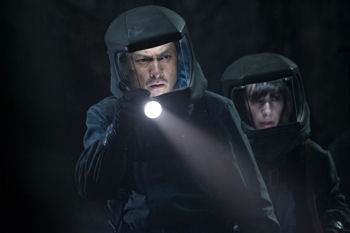 The basic approach that Edwards and screenwriter Max Borenstein take is also pretty clever. Under opening credits, we see nuclear test after nuclear test from the 1950's. All the world's governments were trying to stop Godzilla then, so we can take it one of two ways -- either the 1954 original still happened in this movie's universe, or it was an adaptation of actual events in this movie's universe. (I like such meta questions.) The basic approach that Edwards and screenwriter Max Borenstein take is also pretty clever. Under opening credits, we see nuclear test after nuclear test from the 1950's. All the world's governments were trying to stop Godzilla then, so we can take it one of two ways -- either the 1954 original still happened in this movie's universe, or it was an adaptation of actual events in this movie's universe. (I like such meta questions.)
At any rate, Godzilla disappeared into the depths, never to be seen again until something got awakened in the Phillippines in the late nineties. That something made a beeline toward Japan, and only American nuclear energy engineer Joe Brody (Bryan Cranston) realized that it wasn't an earthquake that destroyed his life's work (and, not coincidentally, his life).
Now Joe is considered a madman, constantly getting arrested by Japanese police as he searches for the truth. His now grown son, Ford (Aaron Taylor-Johnson), has settled in San Francisco and tries to put the past behind him.
He's become an ordnance defusing expert for the Navy, dedicated to keeping destruction from happening. (Conscious decision?) His beautiful wife Elle (Elizabeth Olsen) works as a nurse and raises their son. This is a family devoted to healing.
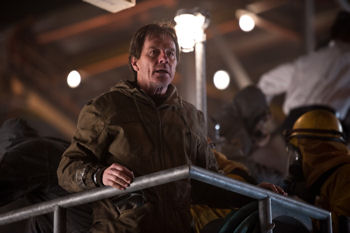 But Joe cannot help drag Ford back to the past. When they cross paths with Dr. Ichiro Sezawa (Ken Watanabe), who knows more of the truth, nothing can ever be the same again. But Joe cannot help drag Ford back to the past. When they cross paths with Dr. Ichiro Sezawa (Ken Watanabe), who knows more of the truth, nothing can ever be the same again.
If that sounds melodramatic, well, yes, it is. And your tolerance for such writing is what will affect your enjoyment of Godzilla. In some ways, the script plays out predictably, and then just when you've settled into its cliches, it throws a curve ball or three.
Due to Godzilla's responsibility as an international phenomenon, none of the characters really get drawn too deeply -- nuance doesn't translate well. It's the magnetic personalities of Cranston and Watanabe that really keep their storylines as watchable as they are, later joined by David Strathairn as the commander in charge of keeping down the menace. But almost everybody else exists only to register horrified and dazed expressions, even British actress Sally Hawkins, who only echoes Watanabe's every move.
Also despite a conspiracy at the beginning, it's welcome that the story drops that idea. There's just no way to hide the destruction -- and a clever trail through Las Vegas that makes it seem more international than it is.
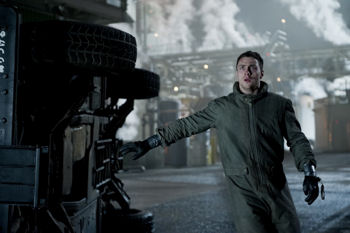 Edwards never lets the human drama take too much time, because really, it can't. Unless you know nothing about Godzilla going in, you came to watch giant monsters fight. Edwards never lets the human drama take too much time, because really, it can't. Unless you know nothing about Godzilla going in, you came to watch giant monsters fight.
And those scenes get staged with the right gusto. There's some gobbledy-gook about how these giant monsters all fed off radiation in prehistoric times, which is why the nuclear age has made them so dangerous.
But it really more seems like Godzilla just hates other monsters, and the creatures dubbed MUTOs (Massive Unidentified Terrestrial Organisms) seem more like something out of Starship Troopers than a Toho classic.
(That makes another mis-step -- the script keeps backing away from just embracing the inherent wackiness of the concept. "Mothra" makes a quick appearance if you're looking really closely, but otherwise, 21st century storytelling has to somehow make everything seem logical. Why not just call them Mutobatras or something? I miss King Ghidra and Rodan.)
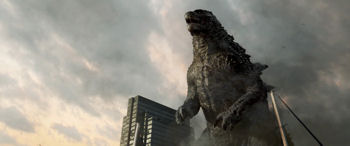 It's a movie that wants to have its Transamerica Building-shaped cake and eat it, too, and often it comes really close. But for me, I wanted it to be more fun, because once those monsters square off, you have to let it be a bit ludicrous or realize -- oh, crap, a lot of people are dead as a result of this. (Though to be fair, not as many as Man of Steel.) It's a movie that wants to have its Transamerica Building-shaped cake and eat it, too, and often it comes really close. But for me, I wanted it to be more fun, because once those monsters square off, you have to let it be a bit ludicrous or realize -- oh, crap, a lot of people are dead as a result of this. (Though to be fair, not as many as Man of Steel.)
Godzilla will probably leave you a bit nostalgic, but it is open ended enough for a sequel that one could hope would just embrace things and go the next level. For now, it's not boring, and it's not terribly insulting. It's just not the King of All Monster Movies it might have been.
|
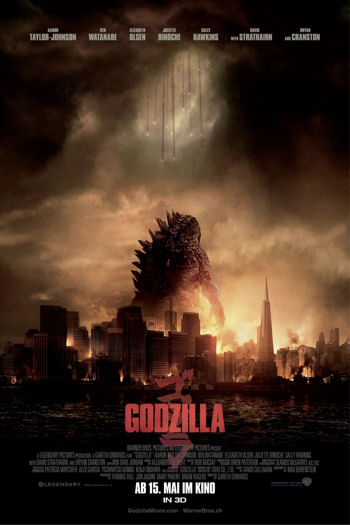
 The basic approach that Edwards and screenwriter Max Borenstein take is also pretty clever. Under opening credits, we see nuclear test after nuclear test from the 1950's. All the world's governments were trying to stop Godzilla then, so we can take it one of two ways -- either the 1954 original still happened in this movie's universe, or it was an adaptation of actual events in this movie's universe. (I like such meta questions.)
The basic approach that Edwards and screenwriter Max Borenstein take is also pretty clever. Under opening credits, we see nuclear test after nuclear test from the 1950's. All the world's governments were trying to stop Godzilla then, so we can take it one of two ways -- either the 1954 original still happened in this movie's universe, or it was an adaptation of actual events in this movie's universe. (I like such meta questions.)
 But Joe cannot help drag Ford back to the past. When they cross paths with Dr. Ichiro Sezawa (Ken Watanabe), who knows more of the truth, nothing can ever be the same again.
But Joe cannot help drag Ford back to the past. When they cross paths with Dr. Ichiro Sezawa (Ken Watanabe), who knows more of the truth, nothing can ever be the same again.
 Edwards never lets the human drama take too much time, because really, it can't. Unless you know nothing about Godzilla going in, you came to watch giant monsters fight.
Edwards never lets the human drama take too much time, because really, it can't. Unless you know nothing about Godzilla going in, you came to watch giant monsters fight.
 It's a movie that wants to have its Transamerica Building-shaped cake and eat it, too, and often it comes really close. But for me, I wanted it to be more fun, because once those monsters square off, you have to let it be a bit ludicrous or realize -- oh, crap, a lot of people are dead as a result of this. (Though to be fair, not as many as Man of Steel.)
It's a movie that wants to have its Transamerica Building-shaped cake and eat it, too, and often it comes really close. But for me, I wanted it to be more fun, because once those monsters square off, you have to let it be a bit ludicrous or realize -- oh, crap, a lot of people are dead as a result of this. (Though to be fair, not as many as Man of Steel.)





